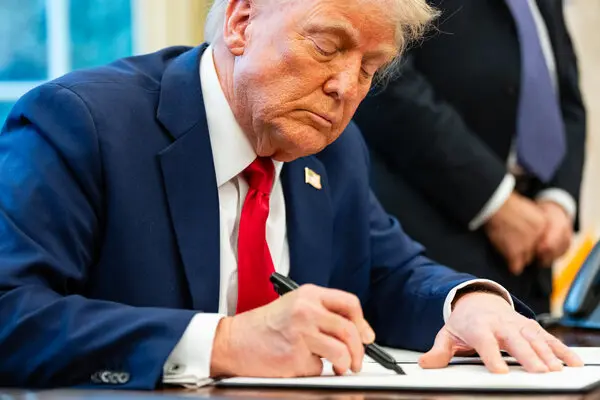The United States’ First Sovereign Wealth Fund: What It Means for the Economy and TikTok

In a historic move, President Donald Trump has signed an executive order establishing the first-ever U.S. sovereign wealth fund. The announcement has sparked widespread discussions about its potential impact on the economy, infrastructure, and even the future of TikTok in the United States. But what is a sovereign wealth fund, and why is this decision significant? Let’s dive deep into the implications of the sovereign wealth fund Trump has proposed and explore its potential consequences for America’s economic future.
What Is a Sovereign Wealth Fund?
A sovereign wealth fund (SWF) is a state-owned investment pool funded by a country’s excess capital, such as oil revenue, trade surpluses, or foreign exchange reserves. These funds are used to generate wealth, ensure financial stability, and invest in infrastructure and other national priorities. Countries such as Norway, China, Saudi Arabia, and Singapore have long operated such funds, using them to diversify their economies and secure long-term economic sustainability.
Why Is the U.S. Creating a Sovereign Wealth Fund?
For decades, the U.S. has lacked an SWF, primarily because of its budget deficits and reliance on Treasury debt to finance government spending. However, Trump has long advocated for an American sovereign wealth fund as a way to enhance national economic security and independence.
President Trump’s vision for the U.S. sovereign wealth fund includes financing national projects such as airports, highways, and medical research. He has also suggested that revenue from tariffs, along with other funding mechanisms, could be used to support the fund. Despite the U.S. running significant budget deficits, the administration argues that America possesses valuable assets that can be monetized to support long-term investment strategies.
Sovereign Wealth Fund and TikTok: A Strategic Investment?
One of the most surprising aspects of the sovereign wealth fund Trump announced is its potential involvement in the acquisition of TikTok. The Chinese-owned social media platform has faced scrutiny over national security concerns, leading to regulatory action and temporary bans. Trump hinted that the American sovereign wealth fund could be used to purchase TikTok, allowing it to continue operations in the U.S. under government oversight.
This proposal raises several questions: Would the government directly control a private company like TikTok? Would there be ethical concerns about public funds investing in private businesses? While such a move would be unprecedented, it aligns with Trump’s broader strategy of leveraging economic tools to exert control over strategic industries.
Funding the Sovereign Wealth Fund: Where Will the Money Come From?
One of the biggest challenges in launching a U.S. sovereign wealth fund is sourcing the capital to sustain it. Unlike countries such as Norway and Saudi Arabia, which fund their SWFs through oil and natural resources, the U.S. does not have an obvious surplus revenue stream.
However, Trump has proposed several ideas for funding the sovereign wealth fund, including:
- Tariffs on imports from China, Mexico, and Canada (though recent reports indicate tariffs on Mexico and Canada have been temporarily paused).
- Monetization of government assets, potentially including public land, buildings, or stakes in infrastructure projects.
- Investment in profitable ventures, such as TikTok, to generate returns for the government.
Treasury Secretary Scott Bessent has stated that the sovereign wealth fund Trump envisions will be operational within 12 months, with a detailed strategy for asset monetization expected in the next 90 days.
Comparing the U.S. Sovereign Wealth Fund to Other Countries’ SWFs
The world’s largest sovereign wealth fund belongs to Norway, with over $1.7 trillion in assets. The China Investment Corporation follows closely behind with $1.3 trillion. These funds invest in stocks, bonds, real estate, and strategic infrastructure projects to ensure long-term wealth generation for their respective countries.
The American sovereign wealth fund would likely differ from traditional models due to its unique funding mechanisms and investment strategies. While most SWFs operate as passive investors, the Trump administration seems to favor an active investment strategy that directly supports national economic and political goals.
Potential Benefits and Risks of a Sovereign Wealth Fund in the U.S.
Benefits:
- Economic Stability: The fund could serve as a financial cushion during economic downturns, reducing reliance on debt financing.
- Infrastructure Development: Investments in highways, airports, and research could create jobs and modernize the nation’s economy.
- Strategic Asset Control: Government ownership of key assets like TikTok could enhance national security.
- Revenue Generation: If well-managed, the fund could generate significant wealth over time, reducing the need for higher taxes.
Risks:
- Funding Uncertainty: Without a clear revenue source, maintaining the fund could prove challenging.
- Government Overreach: Direct government investment in private companies raises ethical and legal concerns.
- Market Volatility: Poor investment decisions could result in losses, ultimately burdening taxpayers.
- Political Manipulation: If not properly managed, the fund could be used for political gains rather than national interests.
The Future of the U.S. Sovereign Wealth Fund
While the concept of a U.S. sovereign wealth fund is still in its early stages, its potential implications are profound. If successfully implemented, it could reshape America’s economic strategy, providing financial stability and new opportunities for national investment.
However, many questions remain unanswered. How will the fund be structured? What safeguards will be in place to prevent corruption? Will it genuinely serve the public interest, or will it become another tool for political maneuvering?
As the Trump administration moves forward with its plans, the world will be watching closely to see whether this ambitious initiative can succeed. Regardless of the outcome, the creation of a sovereign wealth fund Trump has championed marks a significant shift in U.S. economic policy, potentially paving the way for a new era of strategic investment and national wealth generation.



0 Comment